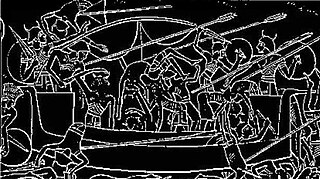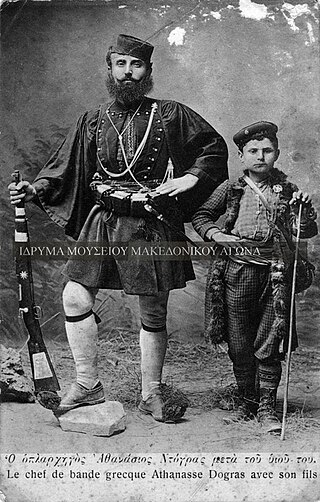
The Sherden are one of the several ethnic groups the Sea Peoples were said to be composed of, appearing in fragmentary historical and iconographic records from the Eastern Mediterranean in the late 2nd millennium BC.

Kastoria is a city in northern Greece in the region of Western Macedonia. It is the capital of Kastoria regional unit, in the geographic region of Macedonia. It is situated on a promontory on the western shore of Lake Orestiada, in a valley surrounded by limestone mountains. The town is known for its many Byzantine churches, Byzantine and Ottoman-era domestic architecture, its lake and its fur clothing industry.
The Camunic language is an extinct language that was spoken in the 1st millennium BC in Val Camonica, a valley in the Central Alps. The language is sparsely attested to an extent that makes any classification attempt uncertain - even the discussion of whether it should be considered a pre–Indo-European or an Indo-European language has remained indecisive. Among several suggestions, it has been hypothesized that Camunic is related to the Raetic language from the Tyrsenian language family, or to the Celtic languages.

The Lepontii were an ancient Celtic people occupying portions of Rhaetia in the Alps during the late Bronze Age/Iron Age. Recent archeological excavations and their association with the Golasecca culture and Canegrate culture point to a Celtic affiliation. From the analysis of their language and the place names of the old Lepontic areas, it was hypothesized that these people represent a layer similar to that Celtic but previous to the Gallic penetration in the Po valley. The suggestion has been made that the Lepontii may have been celticized Ligurians.

Western Macedonia is one of the thirteen administrative regions of Greece, consisting of the western part of Macedonia. Located in north-western Greece, it is divided into the regional units of Florina, Grevena, Kastoria, and Kozani. With a population of approximately 255,000 people, as of 2021, the region had one of the highest unemployment rates in the European Union.
The Euganei were a semi-mythical Proto-Italic ethnic group that dwelt in an area stretching from the Adriatic Sea to the Rhaetian Alps. Subsequently, they were driven by the Adriatic Veneti to an area between the river Adige and Lake Como, where they remained until the early Roman Empire.

Xinomavro is the principal red wine grape of the uplands of Naousa in the regional unit of Imathia, and around Amyntaio, in Macedonia, Greece. This grape is primarily cultivated in Naousa, Goumenissa, Amyntaio, Rapsani, Trikomo, Siatista, Velventos, and, on a lesser scale, on Mount Athos, at Ossa, Ioannina, Magnesia, Kastoria and Trikala. In 2010, the total global cultivated area was 1,971 hectares and was entirely in Greece, but by 2013 this had grown to 2,239 hectares worldwide, with some initial plantings in Gansu, China.

Kastoria is one of the 74 regional units of Greece and is part of the region of Western Macedonia. Its capital is the homonymous city of Kastoria.

Popoli Terme is a comune and town in the province of Pescara in the Abruzzo region of Italy.

Tocco da Casauria is a comune and town in the Province of Pescara in the Abruzzo region of Southern Italy.
Mavrovo or Mavrova can refer to:

Ohrana were armed collaborationist detachments organized by the former Internal Macedonian Revolutionary Organization (IMRO) structures, composed of Bulgarians in Nazi-occupied Greek Macedonia during World War II and led by officers of the Bulgarian Army. Bulgaria was interested in acquiring Thessalonica and Western Macedonia, under Italian and German occupation and hoped to sway the allegiance of the 80,000 Slavs who lived there at the time. The appearance of Greek partisans in those areas persuaded the Axis to allow the formation of these collaborationst detachments. However, during late 1944, when the Axis appeared to be losing the war, many Bulgarian Nazi collaborators, Ohrana members and VMRO regiment volunteers fled to the opposite camp by joining the newly founded communist SNOF. The organization managed to recruit initially 1,000 up to 3,000 armed men from the Slavophone community that lived in the western part of Greek Macedonia.

The Picentes or Piceni or Picentini were an ancient Italic people who lived from the 9th to the 3rd century BC in the area between the Foglia and Aterno rivers, bordered to the west by the Apennines and to the east by the Adriatic coast. Their territory, known as Picenum, therefore included all of today's Marche and the northern part of Abruzzo.
Metamorfosi is a suburb of Athens, Greece.
Popoli is an Italian Jesuit magazine. Founded in 1915, the magazine is published by the San Fedele Cultural Foundation of Milan.

The Museum of the Macedonian Struggle in Kastoria, Macedonia, Greece is housed in a traditional old mansion that belonged to the teacher and fighter Anastasios Pehion (1836–1913). It was inaugurated on 23 May 2010, a project of the "Friends of the Museum of the Macedonian Struggle in Kastoria" that was founded in 1993 in the Municipality of Kastoria.
The fur industry is an important economic activity in Kastoria, Greece. The art processing of fur and the trade in species production developed during the Byzantine period and from then till today the region of Kastoria evolved and became the focus of global concern in the field of fur and unique processing center in Europe.

Popoli is a historical region in Kastoria regional unit of Western Macedonia, Greece, between the cities of Kastoria and Klisoura.

Konstantinos Dogras was a Greek chieftain of the Macedonian Struggle from Vogatsiko, Kastoria.












